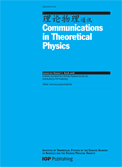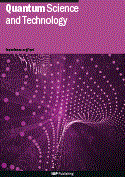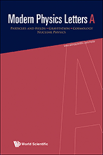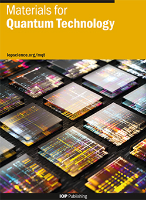
PRX Quantum
Scope & Guideline
Shaping the future of quantum research and technology.
Introduction
Aims and Scopes
- Quantum Computing and Quantum Algorithms:
This area includes research on theoretical foundations, algorithm development, and experimental implementations of quantum computing. It encompasses studies on quantum error correction, quantum algorithms for optimization, and the complexity of quantum circuits. - Quantum Information Theory:
Research in this domain focuses on the fundamental principles of quantum information, including quantum communication protocols, cryptography, and information processing. It aims to explore the limits of quantum systems in information transmission and security. - Quantum Simulation and Experiments:
This scope emphasizes the experimental realization of quantum systems and the simulation of quantum phenomena using various platforms, including superconducting qubits, cold atoms, and photonic systems. It includes studies on simulating many-body quantum systems and their dynamics. - Quantum Thermodynamics and Statistical Mechanics:
This area investigates the thermodynamic behavior of quantum systems, exploring topics like entropy production, heat engines, and the role of quantum coherence in thermodynamic processes. - Topological Quantum Phenomena:
This research focus addresses topological phases of matter, anyon models, and their implications for quantum computing and quantum error correction, including studies on topological quantum states and their experimental realizations. - Quantum Control and Measurement:
This scope includes research on techniques for controlling quantum states, high-fidelity measurements, and the development of advanced quantum sensors. It covers both theoretical frameworks and experimental approaches. - Quantum Materials and Devices:
This area explores the development and application of new materials for quantum technologies, including the study of superconductors, quantum dots, and novel quantum materials that exhibit unique quantum properties.
Trending and Emerging
- Hybrid Quantum Systems:
There is a growing trend towards combining different quantum technologies, such as superconducting qubits with photonic systems, to enhance performance and scalability. This research aims to leverage the strengths of various platforms in quantum computing and communication. - Quantum Machine Learning:
The intersection of quantum computing and machine learning is gaining traction, with studies exploring quantum algorithms for machine learning tasks and the application of quantum neural networks to solve complex problems. - Quantum Error Correction and Fault Tolerance:
Research on improving quantum error correction techniques and strategies for fault-tolerant quantum computation is increasingly prominent as the field prioritizes the development of robust quantum computers. - Quantum Thermodynamics and Information Flow:
The study of thermodynamics in quantum systems, particularly regarding information flow and entropy production, is becoming more prominent, reflecting a deeper understanding of the interplay between quantum mechanics and thermodynamic principles. - Advanced Quantum Sensors and Measurement Techniques:
There is an increasing focus on developing novel quantum sensors and measurement protocols that leverage quantum properties to achieve unprecedented sensitivity and precision in various applications. - Topological Quantum Computing:
Research into topological phases and their application to quantum computing is expanding, with a focus on how these systems can provide inherent error protection and facilitate robust quantum computation.
Declining or Waning
- Classical Simulation of Quantum Systems:
Research focused on classical algorithms simulating quantum systems has decreased as the community shifts towards exploring genuine quantum advantages and the development of practical quantum devices. - Quantum Foundations and Interpretations:
Studies dedicated to the philosophical aspects of quantum mechanics and foundational issues have seen reduced publication frequency, likely as more emphasis is placed on practical applications and experimental realizations. - Quantum Biology and Quantum Effects in Biological Systems:
Interest in the application of quantum mechanics to biological systems appears to be waning, as the focus shifts towards more directly applicable quantum technologies and computational methods. - Quantum Communication with Limited Resources:
Research on quantum communication protocols that assume limited resources or simplified models is declining as the field moves towards addressing more complex and realistic scenarios in quantum networking.
Similar Journals

Physical Review Research
Showcasing the best in rigorous physics research.Physical Review Research, published by the American Physical Society, is a premier open access journal dedicated to the dissemination of high-quality research across all areas of physics and astronomy. Since its inception in 2019, this journal has quickly established itself as a vital platform for researchers, achieving a prestigious Q1 ranking in the dynamics of Physics and Astronomy (miscellaneous) and holding a commendable position in the Scopus Rankings with a rank of #29 out of 243, placing it in the 88th percentile. With the commitment to fostering scientific collaboration and transparency, Physical Review Research offers unrestricted access to valuable findings, enabling researchers, professionals, and students alike to engage with cutting-edge contributions in general physics and astronomy. As it converges into its forthcoming years of publication, the journal remains dedicated to showcasing rigorous research and innovative ideas that drive the field forward.

Quantum
Connecting scholars to the pulse of quantum advancements.Quantum, an esteemed Open Access journal published by the Verein Förderung Open Access Publizierens Quantenwissenschaft, serves as a pivotal platform for the dissemination of groundbreaking research in the fields of atomic and molecular physics, and optics. Since its inception in 2017, Quantum has emerged as a leader in the academic community, boasting an impressive impact factor within the top quartile (Q1) in its categories, ranking #6 out of 81 in Physics and Astronomy (miscellaneous) and #35 out of 224 in Atomic and Molecular Physics, and Optics in 2023. With its global reach, based in Vienna, Austria, Quantum is dedicated to promoting innovative research and fostering collaboration among scientists, researchers, and students alike. The journal encourages unrestricted access to high-quality publications, ensuring that vital advancements in quantum science are available to all, thereby facilitating knowledge exchange and accelerating scientific progress. Explore the cutting-edge developments at the forefront of quantum studies and contribute to a vibrant scholarly community.

PHYSICAL REVIEW LETTERS
Exploring the Depths of Physical Science ExcellencePhysical Review Letters, published by the American Physical Society, is a premier journal in the field of Physics and Astronomy renowned for its rapid dissemination of high-impact research findings. With a distinguished history dating back to 1958 and an impressive ranking of #13 out of 243 in the general physics category, it stands proudly within the Q1 quartile, placing it in the top 6% of journals in its field. The journal focuses on brief reports of significant fundamental research across all areas of physics, making it an essential resource for researchers, professionals, and students seeking to stay at the forefront of developments in their field. Although Physical Review Letters does not offer open access options, its rigorous peer-review process ensures a high standard of quality and relevance in its published articles. With an unwavering commitment to advancing the understanding of physical science, this journal is indispensable for those looking to make a genuine impact in their research endeavors.

COMMUNICATIONS IN THEORETICAL PHYSICS
Advancing the frontiers of theoretical physics.COMMUNICATIONS IN THEORETICAL PHYSICS is a distinguished journal published by IOP Publishing Ltd, focusing on the broad and evolving field of theoretical physics. With an ISSN of 0253-6102 and an E-ISSN of 1572-9494, this journal provides a platform for the dissemination of innovative research that contributes to the understanding of complex physical concepts. Situated in the United Kingdom, it has established itself as a pivotal resource from 1996 to 2024, achieving a commendable Q2 ranking in the category of Physics and Astronomy (miscellaneous) for 2023. With a Scopus ranking of #18 out of 81 in its category, demonstrating a 78th percentile, this journal plays a crucial role in enhancing scholarly communication among researchers, professionals, and students alike. Although it does not currently offer Open Access options, the journal's comprehensive scope and commitment to high-quality peer-reviewed research underline its significance in the scientific community, making it an essential reading for anyone engaged in theoretical physics.

Quantum Science and Technology
Fostering Collaboration in Quantum TechnologiesQuantum Science and Technology is an esteemed academic journal published by IOP Publishing Ltd, specializing in the cutting-edge fields of quantum physics and technology. With a strong emphasis on innovation, the journal serves as a vital platform for researchers, professionals, and students engaged in Atomic and Molecular Physics, Electrical Engineering, and Materials Science. Since its inception in 2016, the journal has rapidly ascended to prominence, achieving Q1 rankings across multiple categories in 2023, reflecting its high impact and influence in the global scientific community. The journal is recognized for its rigorous peer-review process and commitment to disseminating groundbreaking research that pushes the frontiers of quantum science. Although it is currently not open access, the journal remains a pivotal resource for those seeking to stay at the forefront of developments in quantum technology and its applications. As part of its objectives, Quantum Science and Technology aims to connect diverse scholarly perspectives, fostering collaboration and knowledge exchange that can drive forward the quantum field.

MODERN PHYSICS LETTERS A
Illuminating the Path of Modern Physics ExplorationMODERN PHYSICS LETTERS A, published by World Scientific Publishing Co Pte Ltd, is a distinguished journal in the field of physics that serves as a pivotal platform for researchers, professionals, and students alike. With ISSN 0217-7323 and E-ISSN 1793-6632, the journal has gained international acclaim for its contributions to Astronomy and Astrophysics as well as Nuclear and High Energy Physics. The journal is ranked in Q3 for both Astronomy and Astrophysics and Nuclear and High Energy Physics, showcasing its relevance in these areas, while also achieving a Q2 ranking in the broader category of Physics and Astronomy (miscellaneous). Spanning from 1996 to 2024, MODERN PHYSICS LETTERS A promotes open dialogue and dissemination of pioneering research findings and innovative theories. While the journal operates without an open access option, its rich content is easily accessible through various academic databases, ensuring that vital research is shared widely among the scientific community. Situated in Singapore, this journal plays an essential role in the continuous advancement of the physics discipline, fostering collaboration and knowledge sharing among global researchers.

EPJ Quantum Technology
Driving Progress in Atomic and Molecular PhysicsEPJ Quantum Technology is a prestigious open-access journal published by Springer, dedicated to advancing the fields of Quantum Technology, with a focus on areas such as atomic and molecular physics, condensed matter physics, and control engineering. Launched in 2014, this journal has quickly established itself as an influential platform for scholars and practitioners, achieving a remarkable Q1 ranking across multiple categories in 2023, indicative of its high impact and relevance in the scientific community. With an impressive Scopus ranking that places it in the top 15% for condensed matter physics and the top 20% for electrical and electronic engineering, EPJ Quantum Technology serves as a vital resource for researchers aiming to explore groundbreaking technologies and foster interdisciplinary collaboration. By providing unrestricted access to cutting-edge research, it plays a crucial role in disseminating knowledge that drives innovation and enhances understanding in this rapidly evolving field. Based in Germany and reaching an international audience, it is poised to impact the future of quantum science and technology significantly.

INTERNATIONAL JOURNAL OF THEORETICAL PHYSICS
Charting New Territories in Theoretical PhysicsInternational Journal of Theoretical Physics is a premier academic journal dedicated to the advancement of knowledge in the fields of theoretical physics and mathematics. Published by Springer/Plenum Publishers, this esteemed journal has been a vital platform for researchers since its inception in 1968. With an impressive track record and an emphasis on high-quality, innovative research, the journal currently ranks in the third quartile (Q3) in both the Mathematics (Miscellaneous) and Physics and Astronomy (Miscellaneous) categories as of 2023. While the journal is not open access, it offers accessible subscription options for institutions and individuals. The International Journal of Theoretical Physics serves as an essential resource for scholars and practitioners looking to deepen their understanding and contribute to the evolving landscape of theoretical research, making it a key player in nurturing academic discourse and fostering collaboration in its field.

Quantum Information Processing
Dissecting the complexities of quantum error correction.Quantum Information Processing, published by Springer, stands as a pivotal journal within the rapidly evolving field of quantum computing and information science. With an ISSN of 1570-0755 and an E-ISSN of 1573-1332, this journal has been a vital resource since its inception in 2004 and is set to continue contributing until 2024. Ranked in Q2 for Electrical and Electronic Engineering, Electronic, Optical and Magnetic Materials, and various other categories, its high visibility in academic circles is reinforced by its Scopus rankings, showcasing its integral role in advancing theoretical and practical aspects of quantum technologies. Although it operates under a subscription model, Quantum Information Processing prioritizes accessibility to groundbreaking research that covers a wide spectrum of topics, including quantum algorithms, quantum cryptography, and quantum error correction, making it essential reading for researchers, professionals, and students alike. As the field grows, the journal remains committed to fostering innovation and collaboration among scholars, ensuring its position as an influential platform for sharing pivotal advancements in quantum information theory and applications.

Materials for Quantum Technology
Pioneering Research in Quantum Material ScienceMaterials for Quantum Technology is a pioneering open-access journal published by IOP Publishing Ltd, dedicated to advancing the understanding and application of quantum materials and their technologies. Since its inception in 2021, this journal has become a significant platform for researchers, professionals, and students in the fields of condensed matter physics and materials science. With an impressive impact ranking, including a rank of #156 in Condensed Matter Physics and #86 in Atomic and Molecular Physics within Scopus, it offers an interdisciplinary view that facilitates the exchange of innovative ideas and research findings. The journal's open-access model ensures that groundbreaking research is accessible to a global audience, fostering collaboration in the rapidly evolving field of quantum technology. Materials for Quantum Technology continues to support the growing community of quantum researchers, playing a crucial role in the development of new materials and technologies that will shape the future of computation, communication, and sensing.